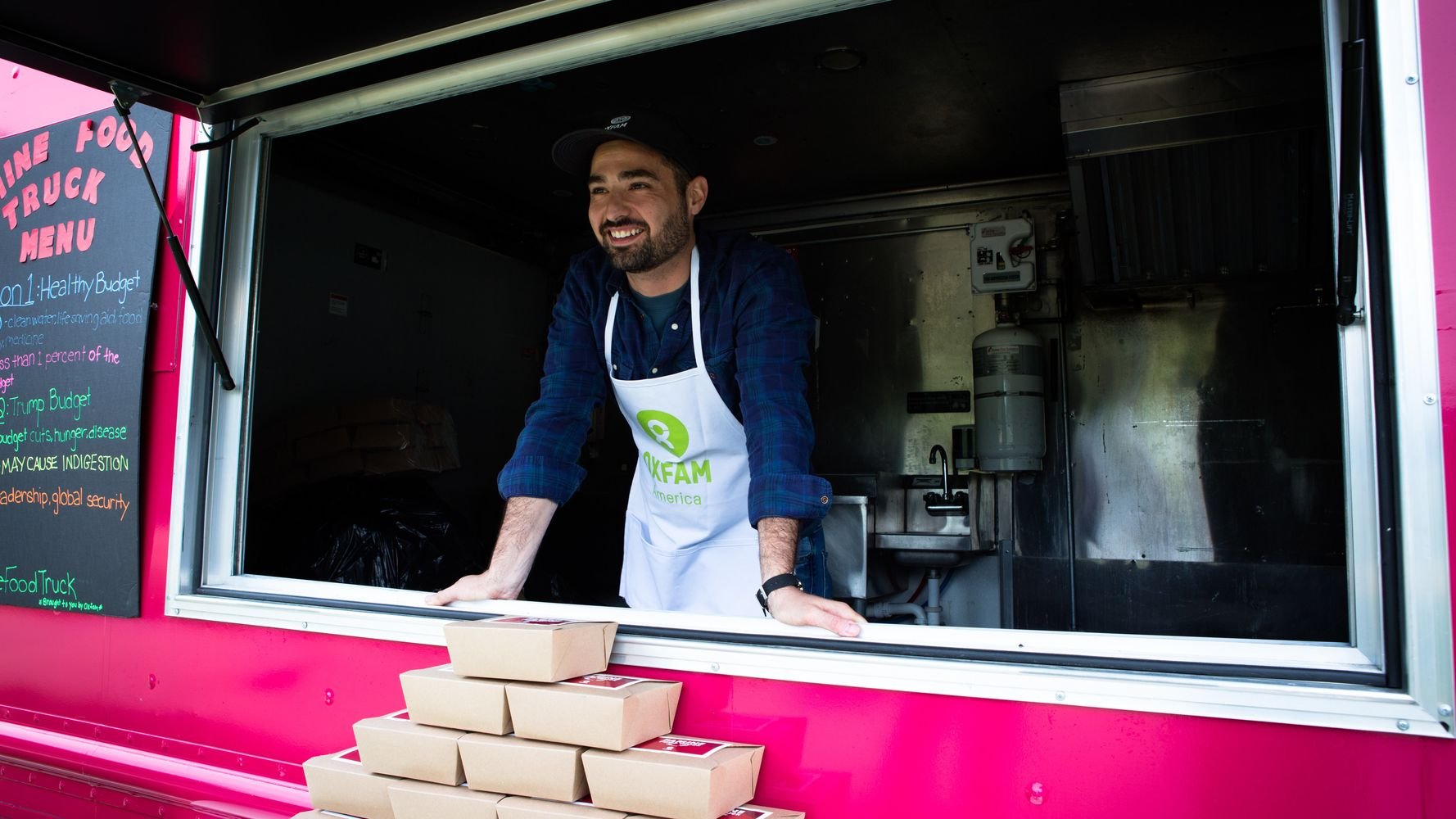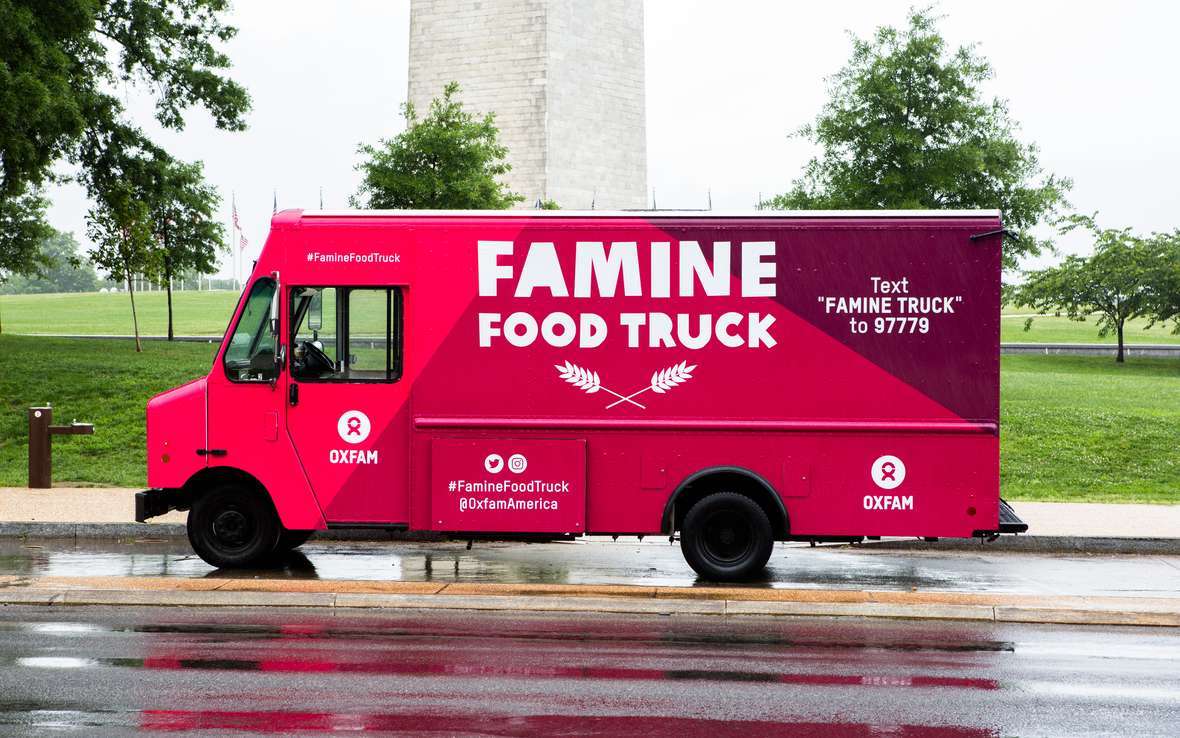Oxfam's director of campaigns holds onto hope even in the face of big money lobbyists and efforts to pit people against one another. "Fighting back means prioritizing the changes that deliver real dignity and opportunity for all of us, whether that’s reproductive liberty or clean air and good jobs."
Mary Babic: Ben, your tenure at Oxfam has extended through some tumultuous times in the US and around the world. Some turns of events have been shocking—the election of Trump, the devastation of the pandemic, war in Ukraine; while others have been sadly predictable—the increase in inequality, surge in White nationalism, stripping away of fundamental rights like access to abortion.
As we plod on into the new year, hope in one hand and outrage in the other, how do we make sense of all this and keep going? Some questions for you.
Let’s start here: How do you see your role as a “campaigner,” and what opportunities do you see for campaigning in the US today? If organizations are still mobilizing people to do something/anything (call, march, email), where do you think they can still have some impact? How will Oxfam leverage these opportunities?
Ben Grossman-Cohen: Oxfam campaigns to try to ensure that the interests of those most marginalized in our society are heard and represented. US democracy is unequal by design, even though decisions made here in Washington impact people across the globe: a privileged few have outsized influence, and that is exacerbated by the dramatic growth in inequality we’ve seen over the last several decades.
There are thousands of lobbyists here in DC throwing millions of dollars at trying to tilt laws in the favor of their pet industries or interests. We try to help amplify and organize people who don’t have that luxury. It’s an unfair fight, but I think the righteousness of our cause has inherent power; and if you work hard enough, and pick the right fights, and you get a little lucky, you can win more often than you realize-even when that seems impossible.

Mary Babic: So let’s talk about the legislative landscape, federal vs state. Is it worth even talking to Congress at this point? In 2021, of the nearly 10,000 bills that were introduced, 85 were passed. That was when Democrats controlled both chambers and the White House! It’s only going to get more difficult to achieve wins in the 118th Congress, with a House that is, to put it mildly, divided as heck. Should progressives be focusing all the efforts toward new legislation on State Houses?
Ben Grossman-Cohen: I do think progressives (and everyone else) ignore state and local politics at their peril. There’s plenty to do that would improve the lives of millions of people just by changing policies in towns, cities and states controlled by Democrats.
In some cases it’s progressives themselves that are the problem; for example, in fights over housing in many cities and communities where NIMBYism* is just the lefty-approved version of a border wall. We’re looking at where we can help make local change happen that would have meaningful global impact, and I expect our campaigns will look at state and local policy in this moment more than they had over the previous few years.
That said, even with a divided Congress we need to walk and chew gum at the same time. Particularly as an organization that seeks to fight global poverty, we cannot look away from the power of the federal government and there will be decisions made, bills passed, regulations written that can and will impact all of us even now. If we just throw up our hands and say “blah gridlock” then it’s just the corporate lobbyists who are going to be here minding the store.
Mary Babic: Any ideas about how to fight the political capture of our legislators by the ultrawealthy and corporations? Since, roughly, the Reagan years, corporations and the ultrawealthy have invested billions of dollars in getting their candidates elected, and getting favorable laws passed, and it’s worked far too well.
Ben Grossman-Cohen: There’s no solution to this problem that doesn’t start with building (super) majority coalitions that can overpower the outsized influence of big money.
That’s easier said than done, obviously. But we just saw the largest ever investment in climate action pass, “paid for” by tax increases on the wealthy and big companies-so it’s possible, even if it’s frustratingly inadequate.
I think we always have to remember that the average voter is just not driven by the same impulse towards dramatic change that most activists are, and our political system is designed to make it really hard to change anything at all. We need to be hellbent on moving that person who is perpetually on the fence, resistant to big change in general, and bombarded with messages trying to make even basic things like a minimum wage increase seem scary.
It’s like Ann Richards’s line about Ginger Rodgers and Fred Astaire, “Ginger Rogers did everything that Fred Astaire did. She just did it backward and in high heels.” Overcoming the power of the ultra-wealthy is going to require not just being a good dancer, we’ve got to do it against the odds. It’s hard!
Mary Babic: Given the landscape and heritage of colonialism and racism, how do you feel about Oxfam as an organization dedicated to fighting systemic inequities? Do we do enough to center people in impacted communities in the US and around the world? How do we, as a largely white Northern organization, do more to empower individuals and communities?
Ben Grossman-Cohen: Unquestionably we are not doing enough. We need to be hardcore, and self-critical about ensuring that we are doing what we say we’re doing, and what we think we’re doing; the last thing anyone needs is a well-meaning do-gooder sucking up the attention and power from people who need it most.
But the reason an organization like us exists in the first place is because some of the people most marginalized in our society, who have the most on the line when decisions are made in Washington, have no vote by design because they live in other countries or because monied interests have used their wealth to capture decision-making processes.
Our job is to try our hardest to ensure that the interests of the marginalized have their voices heard and their needs met. Often that means using our privileged positions to fight for things that otherwise would have no voice in the halls of power.

Mary Babic: In this moment of so many crises exacerbating so many situations, how do we choose? It’s not just Whack-a-Mole, it’s trying to play that game while someone is blowing spitballs at you. Nearly a billion people are facing hunger, while record flooding is driving millions from their homes, while millions of women in the US have lost reproductive choice, while corporations are profiteering off the pandemic and driving inflation on basics like food and energy… where do we start to address the systems of power that got us here?
Ben Grossman-Cohen: We start by setting our north star towards fights that are going to materially improve the lives of all people. Greedy special interests are working overtime to pit us against each other along any and every fault line (race, gender, sexual orientation, age, religion, you name it). They are keen to distract us from our shared interests.
Fighting back means prioritizing the changes that deliver real dignity and opportunity for all of us, whether that’s reproductive liberty or clean air and good jobs.
Mary Babic: So the last question is—what’s giving you hope right now? Something or someone who’s inspiring you to keep on doing the right thing?
Ben Grossman-Cohen: I started working in “advocacy” professionally about 15 years ago, and at the time just getting mainstream attention towards any issue—let alone our specific cause—was a tall order.
But now our culture is saturated, perhaps oversaturated, with a constant fight over how to improve or change things. Just look at what was on cable news; back then you were way more likely to see talking heads debate Anna Nicole Smith’s divorce than you were to hear the phrase “climate change.”
The constant churn can be exhausting, but if you tilt your head, it’s a real harbinger of progress. Now we just need to convert that energy into meaningful improvements in real people’s lives.
____________________________________________________________
*NIMBY – Not In My BackYard



